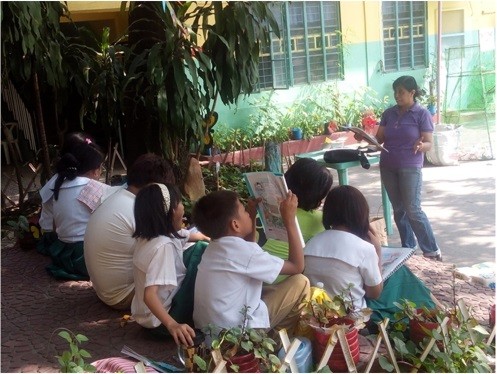
USAID/Philippines’ Education Governance Effectiveness (EdGE) is a five-year (2013-2018) project which seeks to transform local communities as education champions, with the end goal of improving the reading skills for at least one million early grade students. The project is being implemented in 91 local government units nationwide, co-locating with selected project sites of USAID’s flagship reading project, Basa Pilipinas (Read Philippines).
ACTIVITIES
EdGE mentors local chief executives, school division superintendents and supervisors, local school board members and school heads on education planning, management, and evaluation. The project also strengthens the capacity of school governing councils to develop and implement effective and responsive school improvement plans. EdGE also connects the plans to the budgets of the local school boards and barangays through municipal/city education plans that outline the accountability of each governance structure in improving student achievement, especially early grade reading outcomes.
The project ensures a demand-driven and needs-based Special Education Fund budget that finances programs to improve academic performance in public schools.
The budget and processes through which procurement of goods and services is made, including the hiring process for teachers whose salaries are paid by the local school boards, will be transparent and will promote accountability. Local chief executives will be organized into a Regional Education Council which will enable them to share best practices, support and mentor one another.
RESULTS
To date, EdGE has trained 2,718 administrators and officials, expanded memberships of 51 local school boards and school governing councils, and conducted 217 participative education summits.
GOAL
To improve education governance through decentralization, with the end goal of improving learning outcomes, particularly early grade reading for at least one million children.
OBJECTIVES
- Strengthen capacities of the Department of Education, local government units, local school boards, and school governing councils;
- Improve transparency and accountability in education governance at the local level; and
- Increase community engagement to support improved learning outcomes through parents-teachers associations, civil society, and private sector groups.
TARGET AREAS
Ninety one (91) cities/municipalities in La Union, Benguet, Nueva Vizcaya, Quirino, Bulacan, Bataan, Metro Manila, Batangas, Mindoro Occidental, Mindoro Oriental, Camarines Sur, Iloilo, Antique, Capiz, Negros Occidental, Bohol, Cebu, Western Samar, Zamboanga del Sur, Zamboanga del Norte, Misamis Oriental, Sarangani, Surigao del Norte, Maguindanao, Sulu, Lanao del Sur and Tawi Tawi.







Comment
Make a general inquiry or suggest an improvement.